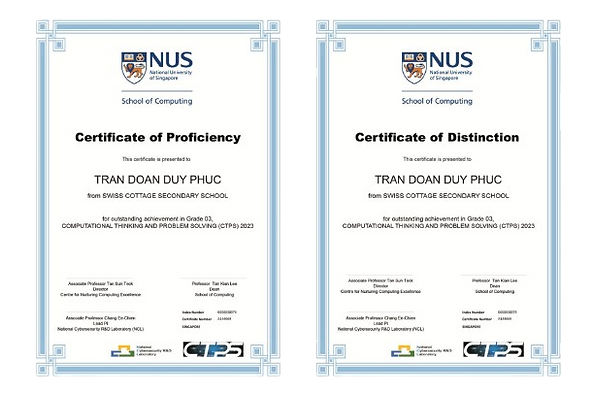

CS2 Course
Data Structures and Algorithms
-
Requires a pass in CS1, OR a Silver Medal at NOI 2023.
-
3 months course, video with 8 Lesson Units
-
Suits for Grades 7-12 (NZ Years 8-13)
Course includes free video training by NUS professors
Registration Deadline
-
Registration Deadline: 13 May 2024
CS2 in-person Online Final Contest
-
Final Contest Date: 11 August 2024
-
Final Contest time:
6 pm - 11 pm (NZ time)
1 pm - 6 pm (Singapore/ Beijing/ Perth time)
4 pm - 9 pm (Sydney time)
Course Details
CS2 is CS2040 in disguise
This course introduces students to the design and implementation of fundamental data structures and algorithms
The course covers:
• basic data structures (linked lists, stacks, queues, binary heaps, hash tables, binary search
trees, and graphs)
• searching and sorting algorithms
• basic analysis of algorithms
• very basic object-oriented programming concepts (more details of OOP are in CS2030) • The programming language used for this course is Java
The fee for enrolling CS2 course: NZ $749
BANK: ANZ
Name of Account: Pinnacle Education Group
Account: 06-0241-0684634-00
Please make payment with the students 'full name + CS2 ' as reference.
⚠️ Please note that any fees and payments made are non-refundable.
⚠️ Before you make any payment, read through the refund policy on our website to avoid misunderstandings.
(Terms and conditions apply).
Lesson Plan
• Lessons are based on video lectures
• Video recordings will be uploaded twice a week
• Students can view recordings on their own time, even if on holiday
Please note: If you registered after the deadline (13 May), the fees will be doubled.
PGA reserves the right to interpret all competition and course arrangements.

CS2 Final Contest Awards
-
For reference only. CS medals are being designed now.
-
CS medals will be from NUS CeNCE (National University of Singapore Centre For Nurturing Computing Excellence).





Computational Thinking
• Similar to Mathematical Thinking
• Quantification via numbers / structures / representations
• Applied towards Modelling and Computation
• Generally categorised by the following skills:
• Abstraction: generalising data into representations and structures
• Algorithmic Thinking: defining process knowledge specifically (primary focus)
• Decomposition: dividing a problem into sub-problems
• Pattern Recognition: generalising relationships (modelling)
Problem Solving
• General process for finding solutions
• Pólya's Problem-Solving Process (4 steps)
1. Understand the problem: define all the relevant information
2. Devise a plan: attempt using methods that you know
3. Carry out the plan: execute the devised plan and try again if it fails
4. Look back: reflect on what worked and what did not
• Default plan: Brute-force Search (i.e. Automated Guess and Check)
